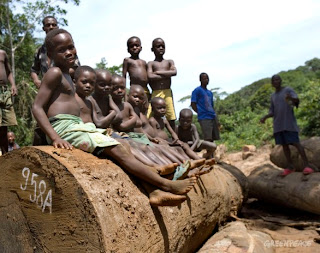Greenpeace works with indigenous communities at the frontline of forest destruction, in Indonesia, the Amazon and the Congo basin. As many as 150 million indigenous people live in forests worldwide, relying on them for their food, shelter, medicines and cultural survival. When logging companies and agri-businesses move in, these communities are usually the first to suffer. Around the world, they find cases in which industries have taken land from forest communities by whatever means necessary - through empty promises, abuse or force. As their homes, livelihoods and traditional land rights are destroyed, subsistence living can turn into abject poverty overnight. Greenpeace believes that these communities hold the future of the world's forests in their hands. If indigenous communities are able to keep the right to control of their own forests, they believe that they will continue to act as guardians of the forest and protect their resources for the future, as many have done for millennia. Greenpeace works with indigenous communities, supporting the demarcation of traditional boundaries and eco-forestry initiatives, and offers a global platform through which these communities can address the rest of the world. Boundary marking is both a social process (involving negotiations) and a physical process (identifying and marking territorial borders). Because it prevents governments from handing over traditionally indigenous territories to loggers and industries, boundary marking is a key tool in helping communities to take back control of their lands, their lives and their futures. Greenpeace has worked with indigenous communities in Papua New Guinea and Brazil to demarcate their territories. In Brazil, they made contact with the Amazonian Deni in 1999 to tell them that some of their lands had been sold to a logging company that would come to cut down trees. They has been working with customary landowners and local non-government organisations in South East Asia (including Papua New Guinea and the Solomon Islands) for over a decade, helping to close down corrupt forestry activities and set up community-operated alternatives, including eco-forestry. With their help the Indians will have the possibility to recover their lands.





No hay comentarios:
Publicar un comentario